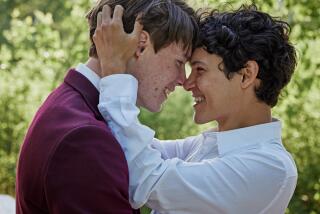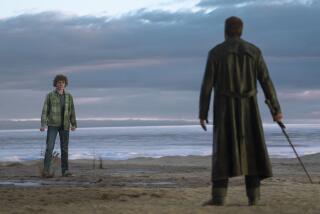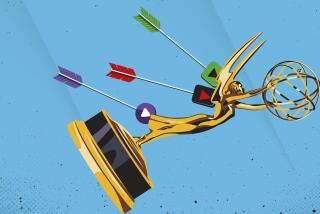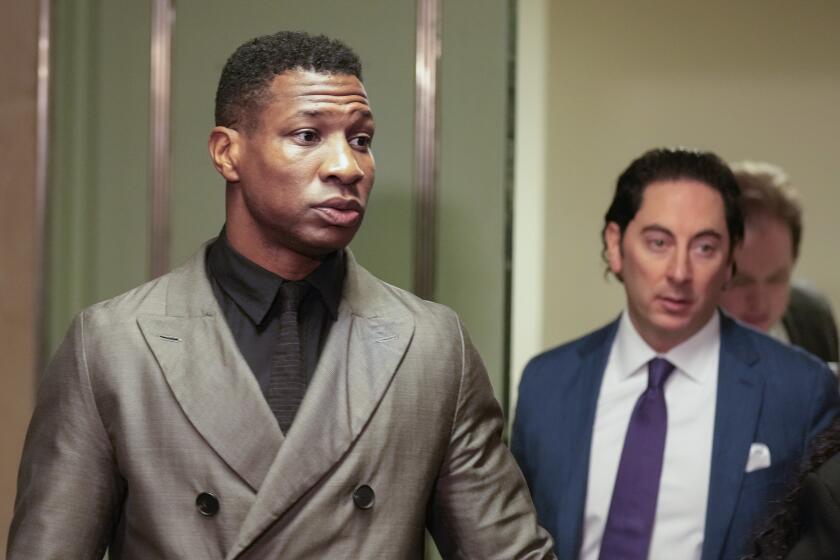Broken ‘Arrow’: A dud finale highlights a series in decline
Using the power of hope to overcome evil magic would be a subpar plot to a “My Little Pony: Friendship Is Magic” movie, much less the finale to a season of “Arrow.”
The image of Oliver Queen besting his enemy and saving the day thanks to the emotional boost of a thousand faceless Star City residents (who have absolutely no reason to have faith in him) is bad enough. But this was a mangled ending foolishly dedicated to a bungled attempt to incorporate magic into the show’s storylines long ago.
Why show such slavish dedication to a broken story arc, why make your viewers sit through a “light can overcome the darkness” plot best suited for a Saturday morning cartoon, only to undercut those developments by turning Oliver Queen back into a killer five minutes later?
“Arrow” tried to rush Oliver into a number of emotional moments in its aptly titled finale, “Schism,” but none of them felt earned, so unsurprisingly, none of them worked. The series’ titular hero has been a backseat driver through the season’s final act. The sixth or seventh most interesting person in his own show. And sometimes that’s OK; however, that was not the case in the finale.
His mission to become a symbol for unity in Star City, to become a hero with a face that means more than the Green Arrow itself, was swept away weeks ago when Oliver abandoned his mayoral bid. For that concept to disappear for a quarter of the season and then re-emerge during a clunky, boiler-plate speech to a crowd of rioters facing impending doom in the finale felt flat and disjointed. It meant nothing, and worse, it was a cheap way to give Oliver the citywide hope needed for the counter-magic in his final fight with Darhk. Oliver didn’t do anything to deserve that hope, he just gave a pep talk while Felicity actually saved the day.
All this did was setup an undercooked final battle between Oliver and Darhk, while a bunch of random Star City residents fought off his goons in the background. The scene came across as a hodgepodge of Batman leading the Gotham City Police Department against Bane’s forces at the end of “The Dark Knight Rises” and a crowd of aggrieved New Yorkers defending Spider-Man from the Green Goblin in the first of Tobey Maguire’s attempts to play the web-slinger, neither of which should be taken as a flattering comparison.
If I was contractually obligated to say something positive about the aforementioned mess, I could at least credit “Arrow” for consistency. It told the story it set out to tell. Oliver’s light overcame Darhk’s darkness. Womp womp.
Light enjoyed a brief 10-second victory lap, and then Oliver ran an arrow through the villain’s gut, undoing that entire arc in an instant. Again, this is not a situation Oliver has been struggling with for months, or even weeks, or even an episode. Oliver had a chance to kill Darhk once before, not long after the bad guy kidnapped his son and was stricken powerless, and he didn’t even entertain it. There was no build to this moment, and with the nukes handled and Darhk’s powers rendered moot, there was no pending threat to lead Oliver to believe he had “no choice.” It wasn’t earned. It wasn’t necessary.
Oliver Queen has defined himself by resisting the urge to kill for three seasons now. If there was ever to be a moment where he needed to take a life again, it needed to come against an enemy who couldn’t be stopped any other way, a force of nature. There needed to be stakes. Here, there were none. Darhk was beaten. The day was won. Oliver killed this guy as an afterthought, basically, not to achieve justice through killing or whatever premise Amanda Waller was spinning in the flashbacks.
The fact that Oliver is entertaining the idea of killing again does set up some interesting fodder for Season 5 (especially without Diggle or Thea around). But this isn’t one of those situations where the destination is more important than the journey, because the journey was a hot mess.
Was Darhk a sociopath hellbent on reshaping the world as he sees fit, or was he a traumatized lover seeking to bathe the Earth in fire because of the loss of his wife? Who knows? The bad guy didn’t have a motive for his apocalyptic plans until the season finale, and even then it seemed like a backdoor explanation.
If Felicity backed away from Oliver because of the lying and darkness that’s inherent in his vigilantism, how is she the only one still by his side after the machinations of that lifestyle forced her to play a role in the deaths of thousands of people last episode? Why did the show even create that moment if Felicity was going to be the team’s beacon of hope in the finale, when she should have been rocked by the gravity of the Monument Point incident that, according to the show’s own timeline, happened just hours earlier?
Unfortunately, the best moments of this “Arrow” season happened long before the year’s finale. There were flashes of the series’ former brilliance in Laurel’s death, the entire Diggle story arc and some of Thea’s struggles with returning to life after her trip to the Lazarus Pit. But those bright spots are hard to see beyond the long shadows of a villain who didn’t fit the series, the disjointed and incomplete telling of Oliver’s season-long arc and the convoluted setup of a nuclear apocalypse that Felicity managed to wipe away without much impact.
I guess the darkness won after all.
Left in the Quiver:
- Seriously, how many times is Malcolm Merlyn going to change allegiances? This is a meme waiting to happen, not a character trait.
- Everything about that final fight sequence was bordering on terrible, not to mention Darhk once again accidentally criticizing the writing. When the villain is pointing out the meaninglessness of the city’s residents suddenly believing in Oliver as a savior seconds after they were rioting, that’s bad. Darhk having to remind us he’s a trained ninja just to validate the final fight of the season wasn’t a great look either.
- Thea sees her threat to kill Darhk’s daughter as a bad thing. I see it as one of the only interesting things that happened in the entire finale. It’s been that kind of season.
- “Now you know how it feels.” – Quentin Lance, never change. I’d watch a Paul Blackthorne series right now, and while I’m happy for him and Donna as the show’s comic relief couple, we have to assume he’s going to snap over Laurel’s death at some point, right? It’s bad enough that Felicity has essentially brushed that nuclear holocaust dirt off her shoulder, but not giving Blackthorne a chance to chew on some scenes of Quentin battling his alcoholism would be a missed opportunity.
- The Undertaking. The Siege. The Outbreak. When your city has code names for its annual cataclysm, you’ve got a serious problem.
- All snark aside, “Arrow” has been in serious decline for two years now. Something is fundamentally broken. Hopefully the sudden shift of having Oliver on his own and entertaining killing again will bring on a much-needed jolt.
MORE:
Oscar Isaac gets his supervillain on for ‘X-Men: Apocalypse’
Marvel’s ‘Captain America’ reveal changes everything you thought you knew about Steve Rogers
Summer TV: 21 shows worth staying in to watch
Follow @JamesQueallyLAT for news from Comicon this July, because hopefully he’ll be in a better mood by then. Also, for crime and police news in the real world.
More to Read
The biggest entertainment stories
Get our big stories about Hollywood, film, television, music, arts, culture and more right in your inbox as soon as they publish.
You may occasionally receive promotional content from the Los Angeles Times.







